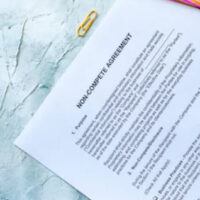Proposed Ban On Noncompete Agreements: Impacts For Florida Design Professionals

US officials generated a passionate response from parties on both sides of the issue after a recent announcement banning noncompete agreements between employers and employees. The Federal Trade Commission (FTC) issued a press release in January 2023, stating that the prohibition would increase workers’ earnings, improve competition, and enhance innovation in multiple market sectors. Around 30 million Americans would be affected, having the freedom to change positions and expand career opportunities without being shackled by a prior employer.
The proposed ban must go through various rule-making procedures before becoming effective, but it does raise important questions for design professionals in the Florida construction industry. If you are among the 18 percent of US workers covered by a noncompete agreement, you certainly want to know about how the ban would affect you going forward. A Florida design professionals attorney can describe some of the implications, and it is also important to understand the statute as it currently stands.
Current Law on Restrictive Covenants in Florida: Noncompete agreements are considered a restraint on trade, so they are generally disfavored in the law. However, Florida law does recognize that companies have interests that could be at risk when an employee exits. Courts will enforce a covenant not to compete if it meets the following criteria:
The agreement is signed by the design professional, either as part of an employment contract or separate document.
It is reasonable in terms of time, area, and industry. A noncompete that extends nationwide and for 10 years is probably not reasonable.
The employer requires a noncompete agreement to protect a legitimate business interest. When requesting a design professional to sign one, the employer may cite customer lists, extraordinary or specialized training, and confidential business information.
The restrictive covenant in question is reasonably necessary to protect the company’s interests. It cannot be overbroad to go beyond this objective.
For design professionals who signed an enforceable noncompete agreement, current Florida law would impose some limitations on employment.
Proposed Rule Banning Noncompetes: The FTC is seeking public comment and assessing information across all industries as it considers enactment. Therefore, the language of the rule prohibiting noncompete agreements could change with amendments and modifications. If it passes, the rule would apply to the conduct of employers. Companies would be banned from:
- Entering into a covenant not to compete;
- Requesting or requiring an employee to sign a noncompete;
- Maintaining a restrictive covenant, meaning one that was previously signed would be considered invalid;
- Telling an employee that he or she is obligated under a noncompete contract; and,
- Attempting to enforce a noncompetition agreement in court.
A Palm Beach County Design Professionals Lawyer Can Explain Specifics
Though it may be some time before a ban on noncompete agreements would go into effect, it is useful for architects, landscapers, and interior designers to realize how it may affect them. For more information, please contact the Jupiter, FL offices of Linkhorst & Hockin, P.A. at 561-626-8880 or via our website. We are happy to set up a consultation with a skilled design professionals attorney.
Source:
ftc.gov/news-events/news/press-releases/2023/01/ftc-proposes-rule-ban-noncompete-clauses-which-hurt-workers-harm-competition
